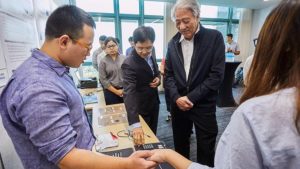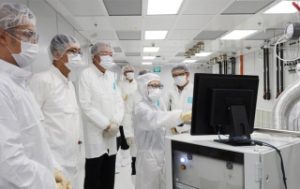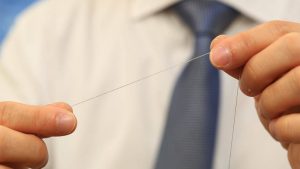
Electronic Skins – Fiction or Reality?
Advanced stretchable electronics open doors to skin-like devices that could potentially personalize beauty regimes, track health indicators and make robotics smarter.

Advanced stretchable electronics open doors to skin-like devices that could potentially personalize beauty regimes, track health indicators and make robotics smarter.

Deputy Prime Minister Teo Chee Hean and Prof Low Teck Seng, CEO of National Research Foundation visited E6NanoFab at Faculty of Engineering on the 20th of March 2019.

On 20 March 2019, at the invitation of Prof Aaron Thean, Director of HiFES programme, Deputy Prime Minister Teo Chee Hean and Prof Low Teck Seng, CEO of National Research Foundation visited E6NanoFab at Faculty of Engineering.

Spinoff.com reported that NUS ultra-thin microfiber sensor project that serves the real-time diagnosis was selected to the Top 100 Science Spinoffs and entered 2% out of 5,000 global science spinoffs according to the following criteria: uniqueness of the technology/product, high commercial potential and positive impact to the humanity’s well-being.
NUS Engineering Secures S$4.9 Million in Partnerships to Develop Next-generation Hybrid Flexible Electronics.

NUS Engineering has launched a new $50 million research initiative, named Hybrid-Integrated Flexible Electronic Systems (HIFES), that will combine conventional rigid electronics with the latest flexible, stretchable electronics to create hybrid systems that will draw from the best of both worlds.

Electronic devices have transformed human society in the last few decades, giving birth to hospital ultrasound machines, manufacturing robots and that smartphone everyone has in their pockets.
NUS Engineering has launched a new $50 million research initiative, named Hybrid-Integrated Flexible Electronic Systems (HIFES), that will combine conventional rigid electronics with the latest flexible, stretchable electronics to create hybrid systems that will draw from the best of both worlds.

